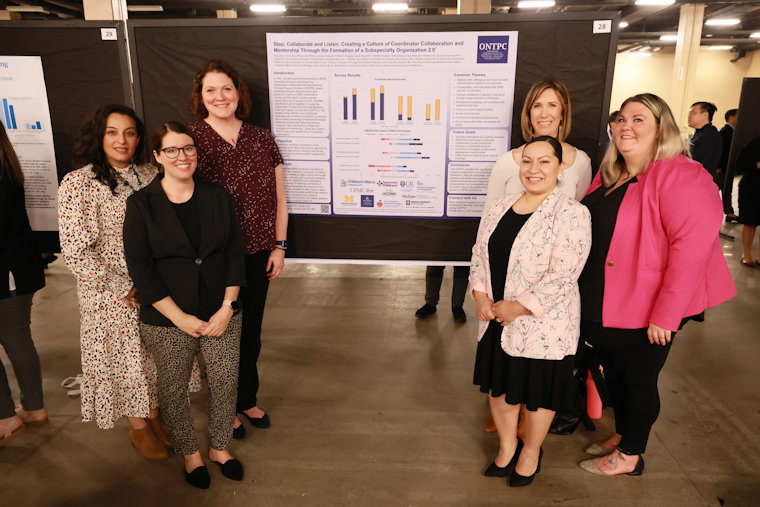The role of a program coordinator in graduate medical education (GME) has become increasingly important, as has improving education and networking for those serving in this role. A 2019 survey indicated that coordinators thrive when they have both general GME and program-specific orientation and education.
In the poster “Stop, Collaborate and Listen: Creating a Culture of Coordinator Collaboration and Mentorship through the Formation of a Subspecialty Organization,” a team of coordinators evaluated the impact creating a fellowship-specific coordinator organization had on the participating coordinators. Maas and team presented their work in the Poster Hall at the 2023 ACGME Annual Educational Conference, held February 23-25, 2023, in Nashville, Tennessee.
Poster Title: Stop, Collaborate, and Listen: Creating a Culture of Coordinator Collaboration and Mentorship through the Formation of a Subspecialty Organization
Primary Author: Kelly Maas, MHPE, C-TAGME, University of Rochester Medical Center/Golisano Children’s Hospital
Co-Authors: Sarah King, MS, C-TAGME, Children's Mercy Kansas City; Meredith Feldman, BS, Graduate Certificate in Leadership, The Children’s Hospital of Philadelphia; Ashley Bonham, BS, C-TAGME, Johns Hopkins All Children's Hospital; Amanda Ross, BS, C-TAGME, University of Connecticut, Connecticut Children’s; Nancy Baumgartner, Ann & Robert H. Lurie Children’s Hospital of Chicago/Northwestern McGaw University; Amy Vezzetti, BA, University of Pittsburgh Medical Center; Ashley Przybylski, BBA, University of Michigan; Joyce Stroud, BS, St. Christopher’s Hospital for Children; Deb Parsons, Indiana University School of Medicine
ACGME: Tell us about your academic and professional role.
Maas: I am a fellowship administrator in the department of pediatrics at the University of Rochester Medical Center/Golisano Children’s Hospital, Rochester, New York, for three fellowship programs: neonatal-perinatal medicine, pediatric cardiology, and pediatric pulmonology. I also serve as a founding executive board member and elected member-at-large of the Organization of Neonatal-Perinatal Medicine Training Program Coordinators (ONTPC).
ACGME: Can you briefly describe your research project for us?
Maas: In August 2020, a group of neonatal-perinatal medicine fellowship program coordinators recognized the need to create a collaborative network of peers. The mission of the ONTPC is to collaborate nationally with all neonatal-perinatal medicine program coordinators to enhance and increase job-specific related knowledge and confidence. To determine if our organization is working to achieve the mission, we created a survey to assess members’ perceptions of the impact of participating in ONTPC.
ACGME: What inspired you to do this project?
Maas: As members of the executive committee, we felt participating in ONTPC activities (meetings, professional development sessions, virtual happy hours, etc.) was having a positive impact on us, personally and professionally, but wanted to see if other members were feeling similarly. Additionally, we wanted to see if we were working toward the mission of our organization, determine areas for improvement, and assess if there were themes for the future direction of ONTPC that would best meet the needs of our members.
ACGME: What did you discover?
Maas: We found that ONTPC members noted significant growth in their coordinator network compared to prior to joining ONTPC. Participation in ONTPC provided members with a 24 percent increase in job-related confidence, a 59 percent increase in job-related knowledge, and a 41 percent decrease in job-related stress. This was achieved by increasing the professional network within the subspecialty, offering opportunities for collaboration, sharing best practices, and offering professional development sessions for members.
ACGME: What was the main takeaway?
Maas: The ONTPC provides the opportunity to improve collaboration across multiple institutions, improve coordinator well-being, to initiate and develop best practices, and provide professional development opportunities. The advancement and sustainability of ONTPC provides a venue for professional and personal growth for neonatal-perinatal medicine coordinators.
ACGME: Who could benefit from this?
Maas: Program coordinators within subspecialty programs could all benefit from the opportunity to collaborate and network with peers within the same fellowship subspecialty. While there are many commonalities across all fellowship programs, we found that it is beneficial to be able to address program specifics with others within the same subspecialty.
ACGME: Any additional follow-up plans?
Maas: Moving forward, ONTPC will be working to launch a mentorship program, strengthen professional development opportunities, and offer in-person networking opportunities at national meetings. (While we have been working together for almost three years, the 2023 ACGME Annual Educational Conference provided the opportunity for many of us to meet in person for the first time.)

